Andrei Sakharov and the defence of the unjustly persecuted
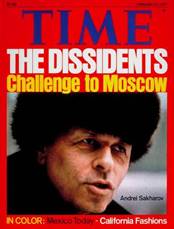 |
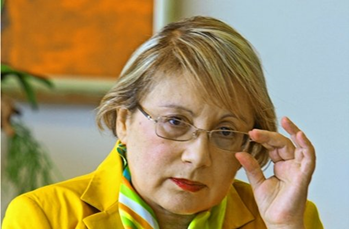 |
|
|
"Defending the rights of others": Andrei Sakharov 1975 – Leyla Yunus 2014 |
||
"On the moral plane the persecution of persons who have defended other victims of unjust treatment, who have worked to publish and in particular to distribute information regarding the persecution and trials of persons with deviant opinions, and of conditions in places of internment, is particularly important."
Andrei Sakharov, accepting the Nobel Peace Prize in 1975
Dear friends,
In September 2014, the European Parliament started the process of selecting this year’s recipient of its annual Sakharov Prize for Human Rights. This involves two more stages until a final winner is chosen on 23 October 2014.
Leading Azerbaijani human rights defender Leyla Yunus has been nominated as one of seven official candidates.
A coalition of European human rights NGOs supports this nomination. We believe that she would be an excellent winner of the 2014 prize, on behalf of the community of beleaguered human rights defenders in Azerbaijan.
The Sakharov Prize honours individuals who act in the tradition of dissent and moral courage associated with Andrei Sakharov. In December 1975 Andrei Sakharov explained, in accepting the Nobel Peace Prize that "on the moral plane the persecution of persons who have defended other victims of unjust treatment … is particularly important."
This was, of course, what he was also engaged in, leading to his long internal exile in Siberia. His 1975 speech was read out in Oslo by his wife. Sakharov himself was standing outside a courthouse in Soviet Vilnius at the time, to protest against the trial of dissident Sergei Kovalev, who was then sentenced to seven years in prison and three years in exile.
This summer a group of Azerbaijani human rights defenders - led by Leyla Yunus and Rasul Jafarov – drew up the list of political prisoners in Azerbaijan. They did so in the noble tradition defined by Sakharov: to "defend other victims of unjust treatment." And they paid for this with their freedom.
For this reason Leyla Yunus would be a deserving winner of the Sakharov Prize in 2014, on behalf of the whole Azerbaijani human rights community.
Her selection would be an important signal to a new generation of dissidents, most of whom are now behind bars in jail on trumped up charges. It would also tell an increasingly shameless government in Baku, which has launched the most serious wave of arrests and repression at the very moment in which it is holding the chairmanship of the Council of Europe, that one cannot both persecute dissidents and claim to be respectable.
 |
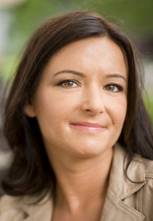 |
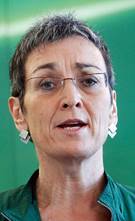 |
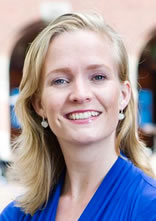 |
|
|
Sebastian Kurz – Tanja Fajon – Ulrike Lunacek – Marietje Schaake |
||||
Recent weeks have seen numerous expressions of concern about the human rights situation in Azerbaijan.
In the European Parliament 27 members from different political groups supported the nomination of three human rights defenders for the Sakharov prize. Tanja Fajon, the vice president of the Social democratic group, played a key role in mobilising support.
The political group of Greens/European Free Alliance put forward Leyla Yunus as their nomination, on behalf of all other human rights defenders in Azerbaijan. Ulrike Lunacek, who is also vice president of the parliament, helped mobilise support. The co-presidents of the group, Rebecca Harms and Philippe Lamberts, stated:
"Leyla Yunus' tireless human rights work in Azerbaijan over a long period is the epitome of that which the Sakharov Prize aims to recognize. We have nominated Leyla Yunus to draw attention to her outstanding work but also to the deteriorating human rights situation in Azerbaijan … The EU cannot continue to turn a blind eye to the rights situation in Azerbaijan, which is a member of the OSCE, the Council of Europe and the EU's Neighbourhood Policy."
On 11 September 2014, Austrian foreign minister Sebastian Kurz went to Baku and handed the list of political prisoners, drawn up by Leyla Yunus and Rasul Jafarov, to the foreign minister of Azerbaijan. This was a very important gesture, which should be repeated by all EU foreign ministers visiting Azerbaijan.
On 18 September 2014, the European Parliament passed a resolution on Azerbaijan, sponsored by a cross-party collation of MEPs, which noted "a major escalation of government repression, pressure and intimidation directed at NGOs, civil society activists, journalists and human rights defenders taking place in recent months" and called on the Azerbaijani government to "immediately and unconditionally" release all political prisoners, including Leyla Yunus.
And yet, despite such expressions of concern, the situation on the ground has continued to deteriorate further. Last week, a UN anti-torture monitoring mission had to suspend its mission due to obstruction by the government, which denied them access to prisons.
All of this makes a strong signal from the European Parliament all the more important. Supporting Leyla Yunus for the 2014 Sakharov Prize would be such a signal.
Many sincere regards,

Gerald Knaus
- ESI newsletter: The LIST and arrests in Baku – Sakharov prize 2014 – Black Sea in Budapest – Capacity building in Kosovo (4 September 2014)
- Leyla Yunus, Rasul Jafarov, Intiqam Aliyev – Candidates for the European Parliament Sakharov Prize 2014
- Anar Mammadli – Shortlisted for the Council of Europe Vaclav Havel Prize 2014
- THE LIST – 98 political prisoners in Azerbaijan – August 2014 / Cases studied by the Working Group led by Leyla Yunus and Rasul Jafarov
- Leyla Yunus, imprisoned since 30 July 2014
- Rasul Jafarov, imprisoned since 2 August 2014
- Intiqam Aliyev, imprisoned since 8 August 2014
- Anar Mammadli, imprisoned since 16 December 2013
- ESI Azerbaijan website
- ESI Briefing: The jails of Azerbaijan – A chronology of recent repression by the chairman of the Council of Europe
- ESI newsletter: Patriarchy in Kosovo – Political Prisoners in Berlin – Godot in Skopje (6 June 2014)
- ESI newsletter: Oslo abuse debate – Mr Jagland goes to Baku – June 2 Berlin event – a tradition of dissent (19 May 2014)
- ESI newsletter: The return of the caveman – 10 years enlargement – new ESI fellows scheme 30 April 2014)
- ESI newsletter: Hunger strike, European values and an Open Letter (23 April 2014)
